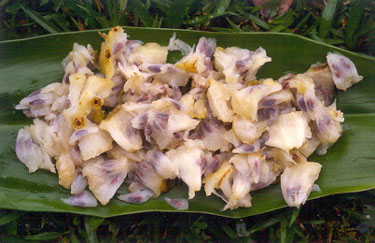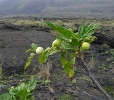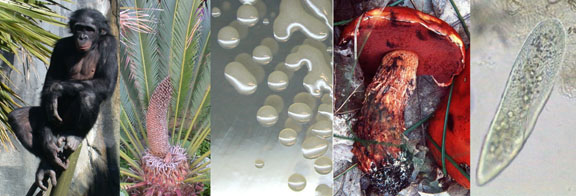Morinda citrifolia
 Morinda
citrifolia, also known as noni, Indian
mulberry, and a variety of other names in various
regions, is a small evergreen tree or shrub that
originated from Indonesia and spread to the Pacific
Basin, Philippines, Japan, China, and Australia. Its
fruit and leaves are a major staple or famine food
in some locations and medicine or dyes in others.
Morinda
citrifolia, also known as noni, Indian
mulberry, and a variety of other names in various
regions, is a small evergreen tree or shrub that
originated from Indonesia and spread to the Pacific
Basin, Philippines, Japan, China, and Australia. Its
fruit and leaves are a major staple or famine food
in some locations and medicine or dyes in others.
Noni is known to have a very unpleasant taste and
smell, some even think ripe fruit smell like
vomit. Noni leaves can be used in a poultice to
cover wounds to promote healing.
 Today
noni is used to cure more internal problems. It can
be used to help cure
malaria, diabetes, cancer,
hypertension, or depression. In fact there was a
recent study focused on using noni to cure HIV and
AIDs. Noni juice or freeze-dried pills have been
used as dietary supplements.
Today
noni is used to cure more internal problems. It can
be used to help cure
malaria, diabetes, cancer,
hypertension, or depression. In fact there was a
recent study focused on using noni to cure HIV and
AIDs. Noni juice or freeze-dried pills have been
used as dietary supplements.
Though food is usually what noni is primarily used for, noni can also be used for other things as well. The bark and roots of noni plants can be used to dye different fabrics like kapa, a type of fabric made from tree fibers. Also the oil in these trees smells very rank and was used as a very effective insecticide that was rubbed in people's hair. Though this plant is amazing it can cause some adverse reactions if mixed with coumadin or warfarin drugs. Please ask you doctor before using noni for any reason.

Go to the Naming and Classification NEXT
